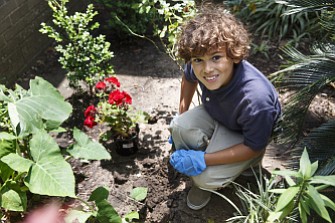Community Garden to Become Hub for Learning to Special Populations Students at HCDE School
Style Magazine Newswire | 5/15/2017, 3:34 p.m.
by HCDE-Texas
A community garden becomes a hub for learning to 100 special populations students enrolled in Harris County Department of Education’s Academic and Behavior East campus as the school gains $2,500 in grant funding.
A groundbreaking ceremony is scheduled for Thursday, May 18 at 1 p.m. at the school, located in southeast Houston at 7703 South Loop East. Students will work in a small, raised garden plot created for the groundbreaking ceremony. They will plant seedlings of the fruits and vegetables, which will then be harvested this fall.
Grant funding of $2,000 for the community garden is supported by Whole Kids Foundation Garden Grant in partnership with Unilever. Scotts Miracle-Gro Foundation also contributed $500 to the garden. The funds come to the school through the Education Foundation of Harris County.
Mindy Robertson, principal of the school and visionary for the project, said about 10,000 square feet will be used for the garden in a field adjacent to the school. Raised beds and hanging plants are planned, with plenty of walking space for children with physical challenges.
“Academically, students will benefit by learning math and science skills used to plan, build and maintain the garden,” said Robertson, explaining the real-world experience the garden lends.
Tracy Shepard-Rashkin, Unilever Sustainable Communities lead, said the company started its efforts to support school gardens in New York City in 2016 and is now expanding the program to Houston.
“As part of Unilever’s broader commitment to food that tastes good, does good and doesn’t cost the Earth, we are on a mission to improve access to fresh food and healthy cooking,” said Shepard-Rashkin. We have partnered with Whole Kids Foundation to fund five school gardens within Houston this year, prioritizing schools that have a high percentage of students who are receiving free or reduced lunches and are within USDA defined low food access areas. We are so excited to be working with HCDE schools to create a brighter future for these kids and their families.”
The school provides an enriching and supportive learning environment for students with intellectual, developmental and behavioral disorders. Students in grades 6-12 will be working in the garden. Another school hallmark is its low, teacher-to-student ratio of 2-to-6.
From measuring and staking out garden space to preparing the soil, planting the seeds, watering, composting, weeding and harvesting, students with a spectrum of physical and mental challenges benefit from the community garden.
Nonverbal life skills students enrolled at the school benefit from the tactile qualities of the garden, the feel and smell of the soil and plants.
“The majority of our students have a sensory disorder,” said Robertson. “A garden on our campus not only gives students a sense of serenity, but it also instills self-esteem and independence as they learn to care for the garden.”
With childhood obesity on the rise in Houston and one in three youth at risk, the garden is a good source for physical activity and healthy eating practices, said Robertson. The school resides in a “food desert” area, a low-income area with few grocery stores selling healthy food.
The community, including parents and area residents, will be welcomed to volunteer in the garden.
HCDE Superintendent James Colbert, Jr. says he looks forward to celebrating the first harvest with students and community. He hopes to join students in cooking the fruits (and vegetables) of their labor in the school’s cafeteria.
“Our students take the work they do very seriously,” said Colbert. “This will be a source of community pride, and we thank Unilever, Whole Kids Foundation, Scotts Miracle-Gro Foundation and the Education Foundation of Harris County for their support.”
About Harris County Department of Education: HCDE helps school districts in the state’s largest county meet the needs of uniquely challenged learners, directly serving students at their schools or one of four HCDE-operated campuses across the county through its HCDE Schools division. Two schools support students with intellectual or behavioral disabilities and two alternative schools provide education for adjudicated or expelled youth. Learn about these services and more at www.hcde-texas.org.








